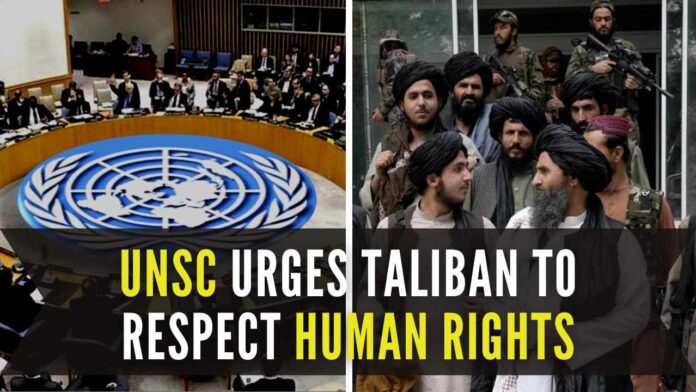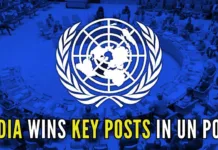
‘Deeply disturbed’ UN Security Council asks Taliban to drop restrictions on women in Afghanistan
Alarmed over the situation in Afghanistan, the United Nations Security Council (UNSC), under the current presidency of India, has voiced concern over the Taliban dispensation imposing restrictions on women and girls’ education and work. The UN urged a swift reversal of these policies which increasingly eroded respect for human rights. This appeal came days after the Taliban banned women from attending university and working for non-governmental organizations (NGOs) last week.
India’s Ambassador to the UN and currently the UNSC President for the month of December, Ruchira Kamboj, issued a press statement late Tuesday on behalf of the 15-nation Council. It said its members are “deeply alarmed” by reports that the Taliban have suspended access to universities for women and girls.
The Council reiterated its “deep concern” over the suspension of schools beyond the 6th grade, as well as its call for the full, equal, and meaningful participation of women and girls in Afghanistan. It “called on the Taliban to reopen schools and swiftly reverse these policies and practices, which represents an increasing erosion for the respect of human rights and fundamental freedoms.”
The members are furthermore “profoundly concerned” by reports that the Taliban have banned female employees of NGOs and international organizations from going to work, which would have a “significant and immediate impact” on humanitarian operations in the country, including those of the UN and the delivery of aid and health work, the statement said. It said these restrictions contradict the commitments made by the Taliban to the Afghan people as well as the expectations of the international community.
India’s current Presidency of the Council and its two-year UNSC tenure ends on December 31. During India’s Presidency of the Security Council in August last year, the Council adopted resolution 2593 that had set forth expectations of the international community regarding Afghanistan, including ensuring that the territory of the country is not used to launch terrorist attacks against other nations; formation of a truly inclusive and representative government; combating terrorism and drug trafficking; and preserving the rights of women, children, and minorities.
United Nations Secretary-General Antonio Guterres had last week said he is “deeply disturbed” by the reported order of the de facto Taliban authorities banning women from working for national and international non-governmental organizations. “This decision will undermine the work of numerous organizations working across the country helping those most vulnerable, especially women and girls,” a statement issued by his spokesperson said. It noted that the UN and its partners, including national and international non-governmental organizations, are helping more than 28 million Afghans who depend on humanitarian aid to survive.
“The effective delivery of humanitarian assistance requires full, safe, and unhindered access for all aid workers, including women,” he said. The reported ban on women working with the international community to save lives and livelihoods in Afghanistan will cause further untold hardship on the people of Afghanistan,” Guterres had said, reiterating that the rights of all women to participate in the workforce contributed to the greater good.
United Nations Women Executive Director Sima Bahous said in a statement the de facto authorities of Afghanistan have once again found new ways to harm the women and girls of Afghanistan. As the world remains outraged by recent decisions to ban women and girls from higher education, the decree barring women from working in national and international NGOs is yet another “stark violation” of women’s rights and humanitarian principles, she said. “We strongly condemn this without reservation,” Bahous said.
She said 11.6 million women and girls are no longer receiving vital assistance. Women-headed households, which make up almost a quarter of households in Afghanistan, have nowhere left to turn and no livelihood support. Many national and international NGOs are unable to operate without their female staff, Bahous said, adding that all services for women are impacted including their access to water, sanitation, hygiene, protection, mobile health, food, shelter, and livelihoods. U.N. High Commissioner for Human Rights Volker Turk pointed to the “terrible consequences” of a decision to bar women from working for non-governmental organizations.
PGurus is now on Telegram. Click here to join our channel and stay updated with all the latest news and views
For all the latest updates, download PGurus App.
- Prime Minister Narendra Modi: A Gujju businessman who does not invest his precious time for a losing battle - April 13, 2024
- NIA arrests two accused Shazib and Taahaa in Bengaluru’s Rameshwaram Cafe blast case from Kolkata - April 12, 2024
- National Herald scam: Adjudicating Authority upholds Rs.752 crore assets attached by ED - April 11, 2024











UN & entire West will give more funds to Taliban & go begging to them, as soon as Taliban shows middle finger to them.